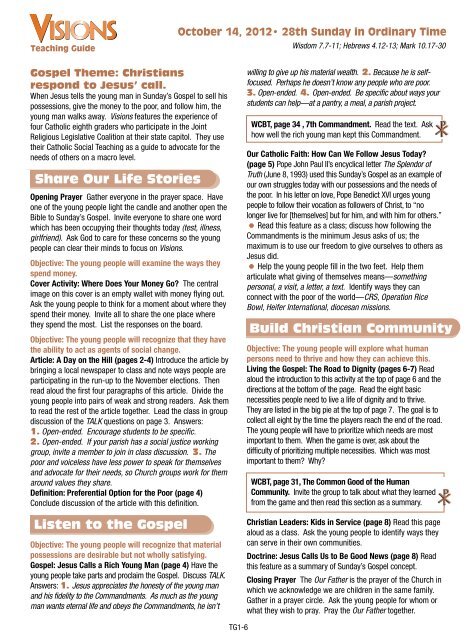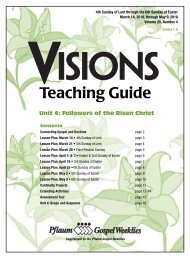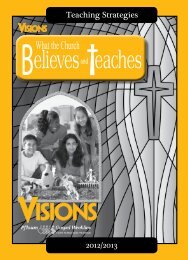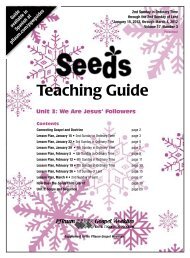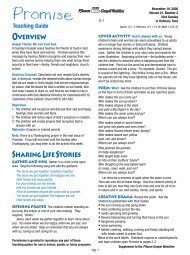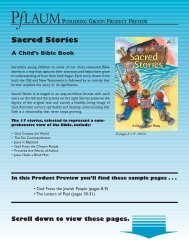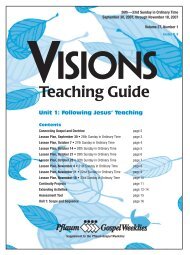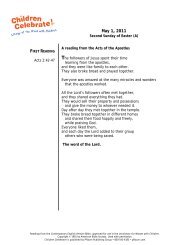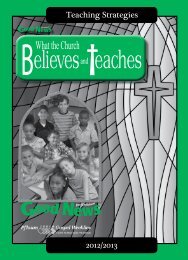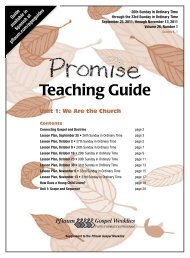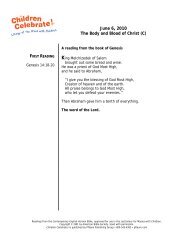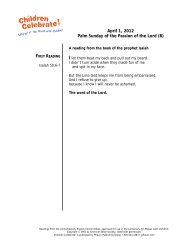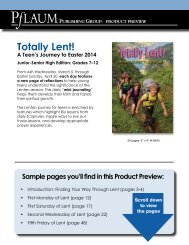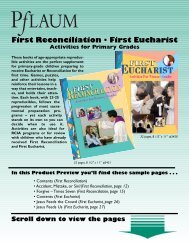Visions - Pflaum Home
Visions - Pflaum Home
Visions - Pflaum Home
You also want an ePaper? Increase the reach of your titles
YUMPU automatically turns print PDFs into web optimized ePapers that Google loves.
October 14, 2012• 28th Sunday in Ordinary Time<br />
Teaching Guide Wisdom 7.7-11; Hebrews 4.12-13; Mark 10.17-30<br />
Gospel Theme: Christians<br />
respond to Jesus’ call.<br />
When Jesus tells the young man in Sunday’s Gospel to sell his<br />
possessions, give the money to the poor, and follow him, the<br />
young man walks away. <strong>Visions</strong> features the experience of<br />
four Catholic eighth graders who participate in the Joint<br />
Religious Legislative Coalition at their state capitol. They use<br />
their Catholic Social Teaching as a guide to advocate for the<br />
needs of others on a macro level.<br />
Share Our Life Stories<br />
Opening Prayer Gather everyone in the prayer space. Have<br />
one of the young people light the candle and another open the<br />
Bible to Sunday’s Gospel. Invite everyone to share one word<br />
which has been occupying their thoughts today (test, illness,<br />
girlfriend). Ask God to care for these concerns so the young<br />
people can clear their minds to focus on <strong>Visions</strong>.<br />
Objective: The young people will examine the ways they<br />
spend money.<br />
Cover Activity: Where Does Your Money Go? The central<br />
image on this cover is an empty wallet with money flying out.<br />
Ask the young people to think for a moment about where they<br />
spend their money. Invite all to share the one place where<br />
they spend the most. List the responses on the board.<br />
Objective: The young people will recognize that they have<br />
the ability to act as agents of social change.<br />
Article: A Day on the Hill (pages 2-4) Introduce the article by<br />
bringing a local newspaper to class and note ways people are<br />
participating in the run-up to the November elections. Then<br />
read aloud the first four paragraphs of this article. Divide the<br />
young people into pairs of weak and strong readers. Ask them<br />
to read the rest of the article together. Lead the class in group<br />
discussion of the TALK questions on page 3. Answers:<br />
1. Open-ended. Encourage students to be specific.<br />
2. Open-ended. If your parish has a social justice working<br />
group, invite a member to join in class discussion. 3. The<br />
poor and voiceless have less power to speak for themselves<br />
and advocate for their needs, so Church groups work for them<br />
around values they share.<br />
Definition: Preferential Option for the Poor (page 4)<br />
Conclude discussion of the article with this definition.<br />
Listen to the Gospel<br />
Objective: The young people will recognize that material<br />
possessions are desirable but not wholly satisfying.<br />
Gospel: Jesus Calls a Rich Young Man (page 4) Have the<br />
young people take parts and proclaim the Gospel. Discuss TALK.<br />
Answers: 1. Jesus appreciates the honesty of the young man<br />
and his fidelity to the Commandments. As much as the young<br />
man wants eternal life and obeys the Commandments, he isn’t<br />
willing to give up his material wealth. 2. Because he is selffocused.<br />
Perhaps he doesn’t know any people who are poor.<br />
3. Open-ended. 4. Open-ended. Be specific about ways your<br />
students can help—at a pantry, a meal, a parish project.<br />
WCBT, page 34 , 7th Commandment. Read the text. Ask<br />
how well the rich young man kept this Commandment.<br />
Our Catholic Faith: How Can We Follow Jesus Today?<br />
(page 5) Pope John Paul II’s encyclical letter The Splendor of<br />
Truth (June 8, 1993) used this Sunday’s Gospel as an example of<br />
our own struggles today with our possessions and the needs of<br />
the poor. In his letter on love, Pope Benedict XVI urges young<br />
people to follow their vocation as followers of Christ, to “no<br />
longer live for [themselves] but for him, and with him for others.”<br />
• Read this feature as a class; discuss how following the<br />
Commandments is the minimum Jesus asks of us; the<br />
maximum is to use our freedom to give ourselves to others as<br />
Jesus did.<br />
• Help the young people fill in the two feet. Help them<br />
articulate what giving of themselves means—something<br />
personal, a visit, a letter, a text. Identify ways they can<br />
connect with the poor of the world—CRS, Operation Rice<br />
Bowl, Heifer International, diocesan missions.<br />
Build Christian Community<br />
Objective: The young people will explore what human<br />
persons need to thrive and how they can achieve this.<br />
Living the Gospel: The Road to Dignity (pages 6-7) Read<br />
aloud the introduction to this activity at the top of page 6 and the<br />
directions at the bottom of the page. Read the eight basic<br />
necessities people need to live a life of dignity and to thrive.<br />
They are listed in the big pie at the top of page 7. The goal is to<br />
collect all eight by the time the players reach the end of the road.<br />
The young people will have to prioritize which needs are most<br />
important to them. When the game is over, ask about the<br />
difficulty of prioritizing multiple necessities. Which was most<br />
important to them? Why?<br />
WCBT, page 31, The Common Good of the Human<br />
Community. Invite the group to talk about what they learned<br />
from the game and then read this section as a summary.<br />
Christian Leaders: Kids in Service (page 8) Read this page<br />
aloud as a class. Ask the young people to identify ways they<br />
can serve in their own communities.<br />
Doctrine: Jesus Calls Us to Be Good News (page 8) Read<br />
this feature as a summary of Sunday’s Gospel concept.<br />
Closing Prayer The Our Father is the prayer of the Church in<br />
which we acknowledge we are children in the same family.<br />
Gather in a prayer circle. Ask the young people for whom or<br />
what they wish to pray. Pray the Our Father together.<br />
TG1-6


